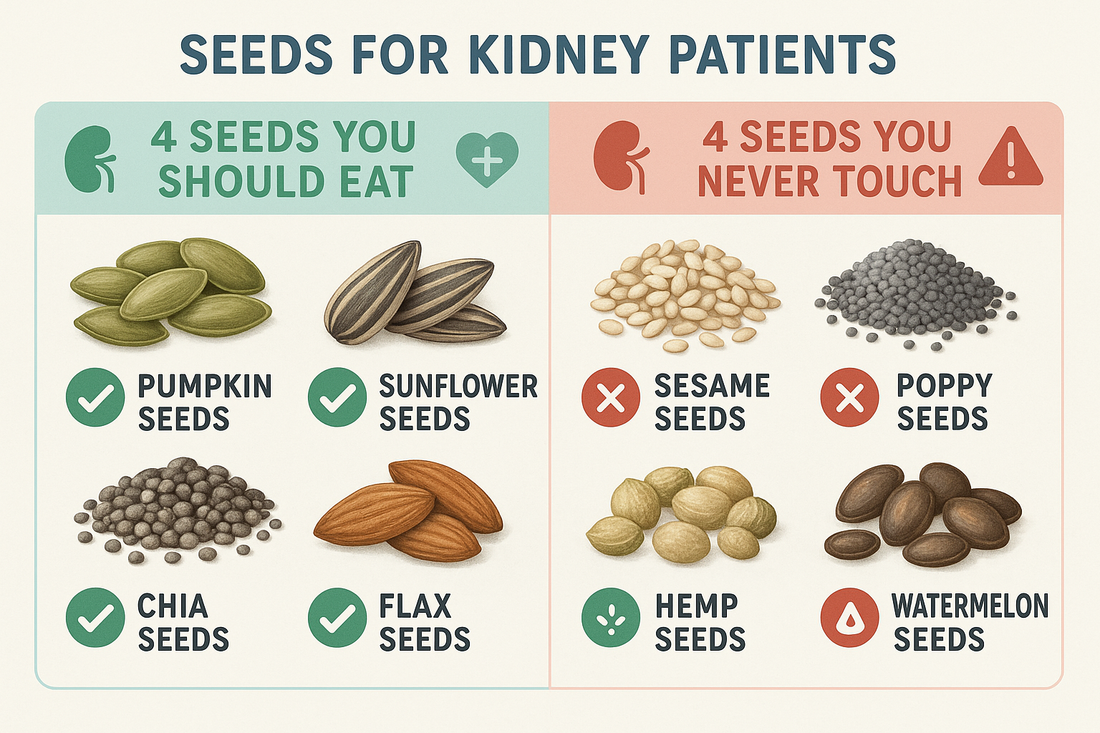
Kidney Patients: 4 Seeds You Should Eat and 4 You Should Never Touch
Share
More than one in seven adults has chronic kidney disease, according to the National Kidney Foundation. Yet most people never hear that common foods can either slow progression or speed it up.
Seeds are among the most misunderstood foods for kidney patients. Every seed contains minerals, fiber, and plant compounds, but not every seed is safe.
Some are low in potassium and support stable blood pressure. Others are loaded with phosphorus and oxalates that create stones and worsen kidney filtration.
Eating the wrong seeds daily can silently raise your creatinine levels.
In this guide, you'll discover:
- 4 kidney-friendly seeds you can eat safely
- 4 seeds that may sound healthy but are dangerous
- 1 lifestyle practice that helps your kidneys filter more effectively at night
Let's start with the safe options.
4 Kidney-Friendly Seeds You Can Eat Safely
1. Chia Seeds: The Omega-3 Powerhouse
Chia seeds are rich in alpha-linolenic acid (ALA), a plant-based omega-3 fatty acid. Just one ounce provides around 5 grams.
For kidney patients, omega-3s help reduce inflammation, improve circulation, and lower the risk of heart complications — a major concern for those with kidney disease.
Chia is also low in potassium (115 mg per tablespoon) and high in fiber, which helps move waste and reduce toxin buildup.
How to Eat Chia Seeds Safely
- Safe serving: One tablespoon daily, soaked in water or almond milk.
- Recipe: Mix one tablespoon with half a cup of almond milk and a pinch of cinnamon; refrigerate overnight and top with blueberries.
- Choose organic, whole chia; avoid flavored mixes or puddings with cocoa or nuts.
Caution: Overeating can cause bloating or discomfort.
2. Pumpkin Seeds: The Zinc-Rich Protector
Pumpkin seeds are nutrient-dense and provide magnesium and zinc — key minerals for blood pressure control and immune support.
They also offer around 9g of plant protein per ounce and antioxidants that protect kidney blood vessels.
How to Eat Pumpkin Seeds Safely
- Safe serving: One tablespoon daily, preferably in the afternoon.
- Grind and mix into smoothies or make a kidney-friendly dip with parsley and olive oil.
- Always buy raw, unsalted seeds. Avoid flavored or roasted varieties.
Caution: Too many pumpkin seeds raise phosphorus intake and can cause indigestion.
3. Sesame Seeds: The Bone-Strengthening Tiny Titan
Sesame seeds are rich in calcium (280 mg/oz) and antioxidants like sesamol and sesamin that reduce oxidative stress and support bone and heart health.
How to Eat Sesame Seeds Safely
- Limit to one teaspoon daily.
- Sprinkle on salads or mix into oatmeal.
- Use tahini cautiously — check for added salt.
Caution: Avoid seasoned sesame snacks or excessive sesame oil.
4. Flax Seeds: The Blood Sugar Regulator
Flax seeds are packed with omega-3s, lignans, and fiber — all of which reduce inflammation, balance hormones, and lower uremic toxins.
How to Eat Flax Seeds Safely
- Always grind before eating; whole seeds pass undigested.
- Safe serving: 1–2 teaspoons daily.
- Mix into smoothies, soups, or kidney-safe baked goods.
Tip: Store ground flax in the fridge and avoid flax oil capsules if on blood thinners.
4 Seeds You Should Never Touch
1. Sunflower Seeds: The Hidden Phosphorus Bomb
Sunflower seeds are extremely high in phosphorus (660 mg per cup) and often salted, which raises blood pressure and causes water retention.
Flavored versions add more sodium and harmful fats.
Better Alternatives: Pumpkin or chia seeds in small amounts.
2. Quinoa: The Potassium Overload Risk
One cup of cooked quinoa contains 318 mg of potassium — risky for kidney patients on restricted diets.
Even rinsed quinoa can irritate digestion due to saponins.
Better Alternatives: White rice, couscous, or small portions of pasta.
3. Hemp Seeds: The Protein Trap
Hemp seeds are high in potassium (360 mg) and phosphorus (450 mg), which overloads weak kidneys. They can also interfere with blood thinners due to vitamin K.
Better Alternatives: Chia or pumpkin seeds in moderation.
4. Poppy Seeds: The Alkaloid Surprise
Poppy seeds contain morphine-like alkaloids that kidneys struggle to filter and may cause false positives in drug tests.
They are also high in phosphorus, weakening bones and increasing heart risk.
Better Alternatives: Baked goods without poppy seeds or nut-free versions.
Bonus: Nighttime Relief for Your Kidneys
Evening Epsom Salt Foot Soak
Soaking your feet in warm water with Epsom salt improves circulation, reduces swelling, and relaxes muscles — helping kidneys rest at night.
How to Do It Safely
- Fill a small tub with warm water and add ½ cup Epsom salt.
- Soak for 20 minutes, 2–3 times weekly.
- Avoid if you have open wounds or diabetic neuropathy.
Quick Recap: Your Kidney-Safe Seed Guide
Safe Seeds (in moderation)
- Chia seeds
- Pumpkin seeds
- Sesame seeds
- Flax seeds
Seeds to Avoid
- Sunflower seeds (high phosphorus)
- Quinoa (high potassium)
- Hemp seeds (high potassium & phosphorus)
- Poppy seeds (alkaloids & phosphorus)
Bonus Tip:
Evening Epsom salt foot soaks can reduce swelling, improve circulation, and help your kidneys rest better overnight.
Key Reminders:
- Keep portions controlled.
- Avoid hidden salt in packaged seeds.
- Store seeds in dry containers to prevent spoilage.
